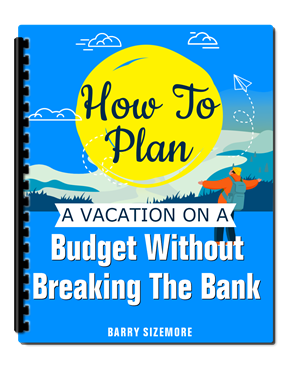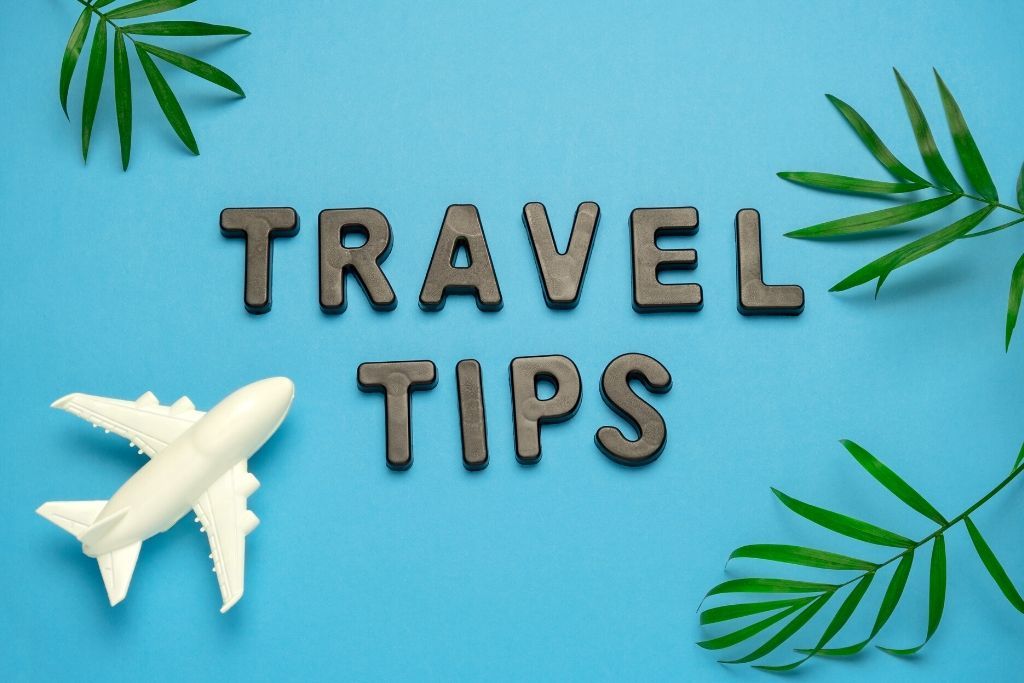Whether you’re traveling for business or going on a vacation, if you want the experience to go smoothly, planning is absolutely necessary.
The best way to ensure a less stressful travel agenda is by not waiting until the last minute to plan and prepare.
It’s the details of the planning process that can ensure your trip is a success. Remember, if you fail to plan, then plan to fail.
For example; if you’re going on a vacation with your family, you probably want to create great memories that last a lifetime.
However, if you attempt to wing it, you may forget to do important tasks that could ruin the entire experience by turning it into a nightmare instead of a dream vacation.
Just imagine getting to the airport and realizing you forgot your credit and debit cards or your passports at home.
That would be devastating, even if you and your family were able to catch a much later flight.
This would cause a lot of stress, anxiety, and not to mention a major delay in travel time, especially considering the fact that most people only have a fixed amount of days off from their jobs.
This delay would cause a negative domino effect, such as waiting for the next flight out, losing the hotel accommodations, and even any booked pre-planned activities.
Regardless of the reason, you’re traveling, you want to be prepared.
The 15 Travel Tips Everyone Should Know will provide you with valuable information that can help you get ready for travel.
Continue reading to get the details…
Tip 1: Plan Every Detail of the Trip
Forward-thinking, anticipating, organizing, and planning all protect your travel interests, save money, and avoids unnecessary costs.
The most helpful currency you have besides your travel funds and monetary resources is knowledge and information.
The more you know about the destinations and places you will be visiting, the more rewarding, safe, enjoyable, memorable, and fiscally successful your visit will be!
A word to the wise: do not over-analyze and worry too much, constantly forgetting that this is about being a little spontaneous as well.
Tip 2: Research Travel and Health Advisories
Verify medical conditions, travel, and health advisories.
Once you have picked your destination, it will serve you well to explore all health matters, including medical insurance and travel coverage you have and need.
Visit your medical practitioner/doctor prior to your trip to ask about immunization prescriptions and more.
Find out what basic and special medicines to take along.
Ensure you know what to do in case of an emergency.
Have the numbers and all insurance information handy.
Tip 3: Don’t Forget Your Glasses or Contacts
Optical tools like glasses and contact lenses, cleaning solutions, eyeglass repair kits and etc., are all travel necessities if you wear them.
Ensure they are on your pre-departure, out-the-door checklist.
Good advice to eyeglass-wearers: take an extra pair of glasses, as well as either a copy of the existing or a new prescription for your glasses, just in case you might need them.
Tip 4: Pack Lightly
One of the most commonly made mistakes made by travelers is packing too much of everything.
Except for the inconvenience, there are also charges and fees for overages.
You have to deal with having to ship personal belongings home, leaving some items at the airport, packing and unpacking bags, removing items, and more!
All these actions are responsive and costly options.
Pack and travel light.
Think minimalism when packing.
Pick items that will suit and serve you well, are multi-purpose, functional, mix and match well, are durable, and are easy-care.
Essentials rather than outfits and accessories, fashion, and color-coded planning dictate the bulging suitcase.
Tip 5: Setting Your Budget
Budgetary concerns and monitoring, fiscal restraint, and disciplined spending when traveling will pay off.
When you are planning your trip and setting up your travel budget, take into account things like ground transportation, tips, other incidentals, extras like laundry and mini-bar, room service, lodging, and meals.
Do the major obligations and essentials first.
Then figure in expenses such as shopping, entertainment, and foreign exchange fees for example.
Not surprisingly at all, it is usually the impulse shopping or spur-of-the-moment expenses that let us overspend and max out our travel budget quickly or overspend.
Tip 6: Create Travel Checklists
Checklists are helpful travel enablers anywhere in the world at any phase of your trip.
Some people write them out and a good tip to remember is that as you pack your bags, make a list of what you are taking.
Expand the list if you buy anything while on your trip that will be going home with you.
On the way home, having this checklist with you will help you avoid leaving or forgetting something along the way, in a bathroom or hotel drawer!
Tip 7: Packing Specialized Storage Bags
A laundry-saving tip suggests taking an ample supply of plastic bags to hold such things as soiled laundry, damp items, and muddy shoes.
These will protect and save your clothing and pocketbook in various ways.
Small bags are excellent for storing toilet articles, stationery items, and medicine.
You can also get specialized luggage storage space-saver, vacuum-type bags to maximize space in your suitcases and keep dirty and clean clothes separated and free from spills and leaks.
Tip 8: Pack a Spare Outfit in Carry-on Luggage
Take a clean set of underwear and one change of clothes in your onboard or carry-on luggage.
It should ideally be packed with any valuables and items necessary to keep you happy, healthy, and clean in case your checked luggage is misplaced, delayed, or worse, stolen!
Tip 9: Tracking Traveling Expenses and Experiences
Take diaries, notebooks, and a couple of empty envelopes for note-taking, budget updates, and receipts.
Many travelers keep diaries, scribbling not forgetting experiences, sharing impressions, recording purchases, and or may we suggest, tracking your spending and budget.
Others might even use them to prepare suggestions for friends who might visit the same place in the future and or save their tax receipts in one place.
It just provides travelers with a good way to record their travel tips and suggestions to share with others as well as having that first step towards your budget consolidation and next trip already started.
This cuts down on the work you will have to do planning and budgeting for your next trip.
You will avoid losing receipts for major purchases and have your proof of payment handy for any customs officer that asks you about it!
In this age of modern technology and smartphones, you know that there’s an App for that.
Tip 10: Arrive Early At the Airport
Arrive early at the airport and allow enough time for security screenings and clearing customs.
Try getting to the airport at least two hours before your flight time on domestic flights and even earlier on international flights.
A favorite or planned book to read, games on your mobile device, or something fun to do will keep you occupied if you do end up having time on your hands.
You will be less stressed and rushed and enjoy your getting their part of your journey, starting the fun part of your travel endeavor early.
A positive travel attitude will focus on the fact that time passes quickly and with most boarding happening early these days due to security concerns it is definitely more crucial to be early rather than risk being refused at the boarding gate due to the new regulations.
Plan for and depart in a timely, orderly fashion, in a more relaxed frame of mind, and without incident.
Be an empowered, action-oriented, proactive perceptive traveler and you will be rewarded with a trip characterized by smooth sailing and good memories.
Tip 11: Renting a Vehicle at Your Destination
Having the ability to mobility when you are traveling away from home is very important.
Driving yourself around gives you more options to customize and optimize your sightseeing and trip to your liking and individual preference.
An enabler of this is your driver's license.
For most of us, our current license to operate a vehicle should be valid in most of Europe and around the world, for a limited time.
However, never assume!
Always check the details as some countries will still require an international license or permit.
Check with your local Department of Motor Vehicles for additional information.
Tip 12: Get Familiar with Currency Exchange Information
Always be informed, prudent and curious about foreign currency exchange, rates, and related subjects that could affect your travel dollar and cash on hand.
There are numerous sources of this information handy to travelers.
You can find out any of the current exchange rates in real-time, from the Internet, stock exchange websites, your own bank, and or by contacting private currency exchange businesses and others, offering this financial service.
Tip 13: Pack Healthy Snacks
Taking care of feeding and fueling the human machine is important.
When traveling, it is all about energy and stamina.
How far can you go and keep on going?
Whether on a led tour or even for traveling alone, it is wise to have handy some ‘snack packs’ and titbits.
These could include raisins, nuts, cheese and crackers, small foil envelopes of tea and coffee, and fresh fruit.
Instant breakfast drinks might also help to replenish and re-energize when you need them most.
Having a snack handy or as a quick pick-me-up, could be a lifesaver and is considered a necessity, not a luxury!
It will also save you money and exercising the option to have “healthy” alternatives on hand, will keep you protected from those dreaded holiday pounds that add on so quickly as well!
Tip 14: Verify Flight Details
Verify flight details down to the smallest detail.
Ensure you can answer questions about your trip and are knowledgeable about the terminology used on your booking and ticket.
For example: What is the difference between non-stop and direct flights?
Yes, the price is mostly!
BUT ALSO: Non-stops do not stop while direct flights may stop several times, but the passengers do not change planes.
Check with your travel agent or airlines if you have any doubts.
Know how long your stopover will be, which city, location, or airport the connection flights will be through, how much time in-between, and if delayed what your options are.
The great news is that you can get your flight details right from the airline’s website and/or their mobile App.
Tip 15: Take Traveler's Checks
In addition to the number of small bills, you carry with you, transport most of your monetary funds in something like guaranteed traveler's checks.
These are freely available through most local banks.
Keeping denominations to low figures is mostly advised.
If however, you are worried about transaction fees on smaller amounts, get a couple of larger denominations to be on the safe side.
As a precautionary security measure, to save money and avoid difficulty, delay and inconvenience, remember to keep a list of the numbers of the checks somewhere separate from the checks themselves in case they are lost or stolen.
Guard ATMs and credit cards and do not carry all your money in one place!
We also advise you to invest in an RFID-blocking wallet or purse with that technology built-in in order to prevent cyber thieves from stealing your credit card information.
Conclusion
While you aren’t able to control every aspect of traveling, you are, however, empowered to plan to the best of your abilities.
It’s just a fact of life that no matter how much you prepare, sometimes things just don’t go according to plan.
And you know what?
That’s okay because if 7 out of the 10 things you prepared for go right, that’s a success.
By implementing the 15 Travel Tips Everyone Should Know, you’ll increase your odds of planning a successful travel agenda that can help you minimize mistakes, save money, reduce stress, and enjoy the process.
Good luck with your travel planning!
Download Our Free E-book!







